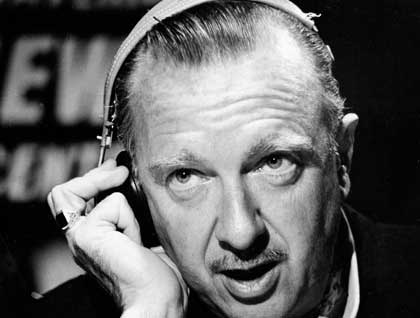
[I'm keeping this up one more day because I'm so proud of this group effort. Please read -- and add your own comments! -- David B.] We're a bunch of veteran TV reporters and critics here at TV WORTH WATCHING, and each of us has his or her favorite memories -- as viewers and as interviewers -- of iconic CBS News anchor Walter Cronkite, who died Friday at age 92. So in a tag-team tribute to one of the finest and most important journalists in television history, today we present a string of salutes, stories and observations about The Most Trusted Man in America...
My own radio tribute to Cronkite, on National Public Radio's Fresh Air with Terry Gross, ran Monday, and can be heard here. Meanwhile, I'll offer some quick comments here, as will the other contributors to TV WORTH WATCHING -- all of whom, it's worth noting, have enough experience and clout to have interviewed Cronkite themselves.
Their respective reflections will be presented in reverse alphabetical order, just so I can't be accused of favoritism. So here we go: Salutes to Walter Cronkite, written by Diane Werts, Ed Martin, Diane Holloway, Tom Brinkmoeller, myself and P.J. Bednarski. I consider this compilation one of TV WORTH WATCHING's finest hours to date, so please enjoy... and add your own comments.
--
Walter Cronkite Wasn't One of "The Boys" -- But Reflected Them Proudly
By Diane Werts
Walter Cronkite is famous not just for being Walter Cronkite. Or being a solid newsman. Or an avuncular presence, America's uncle, or anything else anybody wants to celebrate about the man's life, upon his death.
No, Cronkite remains renowned, 30 years later, for being the primary face of a TV program that remains the gold standard for a nightly news broadcast. His CBS Evening News, from 1962 to 1981, was reported by a cast of correspondents whose names I can still remember, in an era when few current viewers can cite reporters in TV news today.
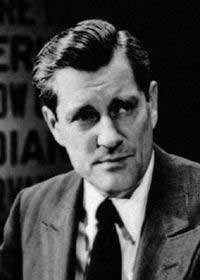
Richard C. Hottelet. Charles Collingwood. Robert Pierpoint. Roger Mudd. Terry Drinkwater. Eric Sevareid (pictured). Barry Serafin. Robert Trout.
OK, those are just great names, in and of themselves, especially said aloud, as correspondents do when wrapping their report. But they're also memorable because they were such authoritative reporters -- men (nearly all men in those days) who knew how to go out and get a story, and how to bring it back and boil it down to a couple of salient minutes saying more than hours of "breaking news" babble today, and how to do it with an eloquence, clarity and flair born of working with the meanings of words, not "sound bites" or "pictures arriving now."
These men had most often cut their teeth in newspapers, typically, or print wire services. And in war, World War II mostly. Some in radio,and later video. But all of them did it in a day when reporters knew how to gather their own information, not simply relay facts or hearsay procured by producers or researchers. They had to harvest it from personal sources, not merely parrot press room briefings. They could write with fluency. After actually thinking it through, themselves.
Cronkite had worked for United Press (forerunner of UPI), where he'd covered postwar news in Belgium and the Netherlands, the Nuremberg trials, and even Stalin-era Moscow. Hottelet came from UP, too, where he'd been stationed in pre-war Berlin. Collingwood, also, reporting from London. And Howard K. Smith, later known as ABC's evening anchor, who jumped from UP to work alongside Hottelet in Berlin for CBS Radio.
Sevareid, later known for his columnist-style commentaries in Cronkite's "Evening News" broadcasts, learned his trade in print, too. He'd worked for newspapers in Minneapolis and Paris, before joining the radio gang known as "Murrow's boys," having been assembled mid-century by CBS news legend Edward R. Murrow.
Trout (pictured below) was the rarity who'd been in radio from the 1930s, having pioneered the "anchor" role of helming a "roundup" of reports from correspondents in farflung locales.
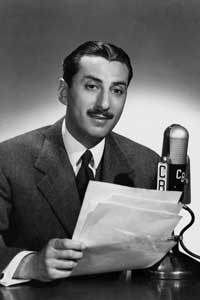
Walter Cronkite would eclipse Trout as his most illustrious professional descendent. But Cronkite didn't do it alone. He couldn't possibly have been the "voice of authority" without that authoritative broadcast behind him -- without commanding reports to introduce, in a broadcast widely considered the country's most respected, from a news organization that defined the word "esteemed."
It was an era of three networks, when only two had widely respected newscasts. (NBC's Huntley-Brinkley Report, airing 1956-70, was a compelling and occasionally more highly rated competitor.) Nearly all Americans watched Cronkite's CBS Evening News at some point, if not regularly.
"Uncle Walter" became a household name, a trusted source, a daily companion, to Americans of all ages.
But he was no lone ranger.
And Cronkite would have been the first to report that.
--
This Just In: Uncle Walter Did NOT Sail with Princess Di...
By Ed Martin
I have interviewed hundreds of famous people during the last 20 years and can recall only two times when I was awestruck. Fortunately, in both instances the awe struck me after the interview had been completed. The first time this happened was when I interviewed Walter Cronkite in March, 1995. As I stepped out into the bustle of midtown Manhattan after our meeting, I suddenly froze and said to myself, "Damn, that was Walter Cronkite!"
(The second moment of awe came after a brief interview with Steven Spielberg in Los Angeles ten months later. As I turned my tape recorder off and turned away from him I mumbled, "Damn, that was Steven Spielberg!")
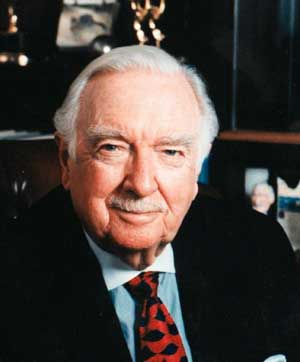
I interviewed Cronkite shortly before the premiere of Headlines and Sound Bites: Is That the Way It Is?, an installment of The Cronkite Report, a quarterly series he was producing for Discovery Channel at the time. The intent of the program was to determine how well broadcast and print press had been serving the information needs of the public in the Nineties.
In hindsight the timing was profound, not simply for the premiere of Cronkite's show but for my interview. The traditional understanding and consumption of news reporting, which up to that time had been challenged only by CNN and television tabloid shows, was about to be uprooted by the arrival during the next two years of MSNBC and Fox News Channel, not to mention the first significant surges in home computer usage and the creation of Internet content.
We didn't realize it at that moment, but the media world Cronkite had known throughout his career, and that I had known throughout my lifetime, was about to come to an end.
Cronkite was relatively upbeat on the subject, despite growing concerns from critics and media observers that fragmented attention spans and the appeal of the sound bite were corroding news reporting on television. Not so, Uncle Walter asserted. He explained to me that a study undertaken for his program found that TV news at the time treated the four or five top stories of the day with the same attention, almost the same time and space emphasis as newspapers.
Who knew? Not Cronkite: He admitted that his final assessment "was a little different than we anticipated when we started the piece." He did give newspapers the advantage because they continued to report stories long after they had fallen off the nightly news.
Still, he was gravely concerned at the time with the growing tabloidization of news (especially its impact on local news broadcasts, which he dismissed as "pretty much of a disaster across the country") and gross factual errors in local and regional newspapers.
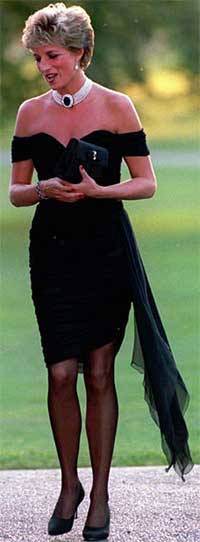
He shared with me a story about Princess Diana's early-Nineties visit to Martha's Vineyard, where Cronkite maintained a home and indulged in his passion for sailing. After a reporter from The Cape Cod Times speculated about it, The Boston Globe, The Washington Post and the Associated Press all reported that Cronkite had taken the princess for a ride on his boat.
In truth, he said, the two never crossed paths during her stay on the island. But the reports took on a life of their own, and soon thereafter a leading newspaper in London revealed that Diana had chosen to tell her life story to Cronkite via a new TV series and had travelled to Martha's Vineyard to negotiate the deal. The story, he told me, "Didn't contain one iota of truth."
--
Walter Cronkite: The Texas Connection
By Diane Holloway
During the course of my 30-year career as TV critic for the Austin American-Statesman, I wrote more than a dozen pieces on Walter Cronkite. His Texas roots ran deep, from his childhood in Houston to his Austin days as a journalism student at the University of Texas to his return to Houston as a cub reporter for the Houston Press.
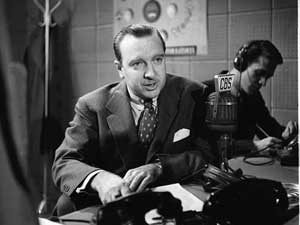
He wrote for the Daily Texan (UT's newspaper) and was a part-time sports reporter for a local radio station in Austin. His daughter Kathy and his two grandsons still live here and he remained an adjunct communications professor at UT until his death.
Here are some of my favorite Cronkite interview moments:
On CBS's decision to bump him from the anchor desk in 1981 and then keep him off the air but tied to a lifetime "special correspondent" contract: "It's not the way I want it, quite honestly. I'd love to have them make better use of me... They need somebody with historical knowledge and capability, but it's too late for me now."
On his memories of growing up in Houston in the Depression: "My mother denied it, but I know good and well that she made hamburgers out of dog food."
On his move from print to the new TV journalism: "We literally figured it out as we went along. For an old newspaper man, it was like carrying a printing press around."
On his pick for biggest story: "Space. Man leaving his environment and landing on another orb is certainly the biggest story of the 20th century." Cronkite always got misty talking about space.
--
Uncle Walter at Walt Disney World
By Tom Brinkmoeller
I watched CBS' assassination and moon landing coverage, wrote about the Cronkite-to-Rather transition and had a few other contacts with Walter Cronkite as a reporter.
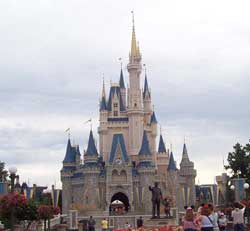
But the ones I remember most happened several years after I left the paper. I was working as a Walt Disney World publicist, assigned to the new movie theme park that was being built, when Mr. and Mrs. Cronkite visited Disney's Florida park.
They were asked if they would like a pre-opening tour of parts of the park, and when they said yes, I was assigned to see if we could get some publicity out of the event. I met them as they were touring the New York City backlot, a movie-like permanent set that would have worked for movies, had any ever been shot there.
Celebrities who were asked for favors like this, a publicity photo shoot, weren't predictable. Some were agreeable; others growled and flashed their celebrity fangs. The Cronkites were totally gracious, happily posing by a parking meter on the fake street. He even pulled a quarter out of his pocket to feed the phony meter.
A couple of months later, Cronkite and Robin Williams were on an L.A. sound stage to record the audio for an animated film Disney was to use in the new park's animation-studio tour. I was there, too, to collect background for press kits yet to be written.
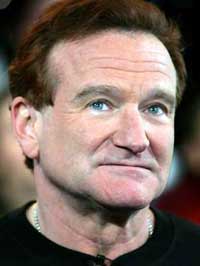
Had I relied only on Williams, whose protective handlers stood like a wall between the ordinary and their man, I would have gone home with an empty notebook. But Cronkite, who arrived without any entourage and joked with the crew, took time to talk, and the notebook ended up full of good stuff.
In both encounters, Cronkite was under no obligation to help me out. But he did, and he seemed to enjoy it. In both cases he treated everyone he met with the same genuine kindness. Once you met him this way, you learned the term used so often to describe him, "avuncular," reached far beyond his gray hair or authoritative voice and delivery. He was the kind of person you'd love to have for an uncle.
--
Uncle Walter Meets Uncle Barky -- and Betty Bacall
By David Bianculli
In 2006, as TV Critic for the New York Daily News, I noted the occasion of Walter Cronkite's 90th birthday by stating the following:
"As Walter Cronkite enters his ninth decade, it's worth noting - though not necessarily celebrating - that there will never be another like him.
"No matter how long TV continues, the likes of Uncle Walter, once heralded in surveys and the press as the 'most trusted' man in America, will not be seen again. It can't happen."
Except for that fact that Cronkite, at that point in his life, actually would have been entering his TENTH decade, I stand by my story. TV is too fragmented. TV news is too slight.
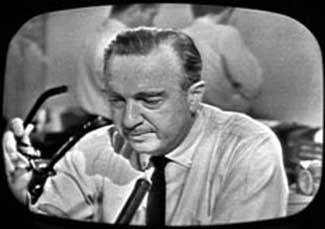
I'm old enough, and lucky enough, to have witnessed all of what might be called Walter Cronkite's greatest hits: the JFK assassination coverage, the space race and moon landing, his Vietnam special report. (I play clips from all of them on my Fresh Air report.) Any one of those could have made a career. Cronkite's career incuded them all, and more. Next to Edward R. Murrow, who virtually invented the professional standards of broadcast news on CBS Radio (and, later, on TV's See It Now), Walter Cronkite was the best of his kind.
But of all my Cronkite memories, the two I'd like to share here are more random and less known.
The first came in 1978, the year CBS mounted a celebrity-filled prime-time special celebrating its 50th anniversary as a broadcast entity (using radio, not TV, as a starting point). The networks had money to burn in those days, and CBS burned some of its by mounting a ridiculously lavish party in New York, inviting almost every star who had been part of the network's 50-year history.
I was a young TV critic for what then was the Fort Lauderdale News, and found myself, early on, so intimidated by all the star wattage that I sat against a wall in a chair, watching quietly as a roomful of famous people attacked the shrimp buffet and congregated at the bar. All of a sudden, Walter Cronkite, who was walking with a cane because of a leg injury he'd just gotten while sailing, sat in the seat next to me, and struck up a casual conversation.
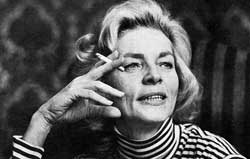
I'd never met him before, but he acted like we were old buddies as he whispered war stories about one celebrity after another. Then he pointed to one, Lauren Bacall, and raved about her: so beautiful, so sexy, so classy. At that moment, she turned around, saw Cronkite, and immediately came over. "Hi, Betty," he said, beaming widely and rising to greet her. She sat next to him on the other side, and I listened -- the luckiest fly on the best possible wall -- as the two of them told stories about everybody else, and laughed, and drank.
The second occasion was decades later -- in 2006, as Cronkite faced TV critics as a press conference for his coming American Masters profile on PBS. Cronkite sat there, in front of an understandably respectful room of reporters, telling tale after tale about presidents, colleagues and earthshaking news events.
Ed Bark, then the veteran TV critic for the Dallas Morning News (and now running a terrific website about TV called UncleBarky.com, got so annoyed that other reporters were cutting off his attempts to ask Cronkite a question that he finally shouted one down, demanding that it was his turn. Cronkite's eyes sparkled, and he clapped his hand together, at the temporary dust-up. NOW we're having some fun, he said, or something like that -- obviously gleeful that the press conference had taken a competitive turn.
For Cronkite, that's the way it was in his day... and the way he always liked it.
--
When Cronkite Died, So Did Broadcast Network TV News
By P.J. Bednarski
The death of Walter Cronkite signifies the official end of broadcast network television news. Network news divisions may claim impressive achievements while they lived, but Cronkite was the final, definite period at the end of the sentence.
Cronkite's death erases the last presence of broadcast news stature -- with only Mike Wallace, Morley Safer and a few other lesser lights as the last remnants of the network swagger.
Most people think that's OK: When network television ruled, there weren't many national competitors, and none on television. Everybody who wasn't there knows it was awful that three powerful gatekeepers decided what was important.

Thank goodness news organizations do a much better job of representing diverse points of view these days, with dignified, thoughtful informed news and opinion. The bold truths from Glenn Beck, the cool calm of Chris Matthews, the Lincoln-Douglas quality debates on The View and the entire crusading predator-baiting thing on NBC are displays of the sophistication television has developed since Cronkite signed off in 1981.
When Cronkite said, "That's the way it is," no doubt he didn't believe it. Nor did intelligent viewers. But the fact that Cronkite proclaimed it gave CBS News the crown of certitude. This wasn't all the news there was, he was saying, but that which CBS and Cronkite had presented was the truest version.
He might have believed it was true and it might have been at least mostly true, which is extraordinary to consider now, given the hundreds of versions of fact that news consumers now have the option to choose. Long after he left, Cronkite's sign-off continued to engrave the stature of that network. It might be why those who attack "network news" save special ire for CBS. It bragged about its world view, and for 20 years it had this utterly regular guy representing it.
Next to The New York Times claiming it has "All the News That's Fit to Print," no other American news organization really speaks in superlatives about its journalistic acuity. They might talk about their popularity. But they don't say, in essence: We Know What's Going On.
Cronkite was a perfect fit for the William S. Paley era of CBS News, during which CBS did have authority its competitors lacked, or, when it didn't, acted like it did. When Laurence Tisch began to dismantle the news division, it wasn't surprising the big names at CBS News contemplated seceding from the network. You'd have thought that the B in CBS stood for brio.
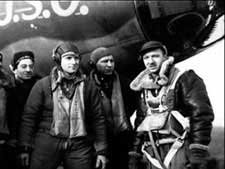
And that's what's over with Cronkite's death. It's the definite nail in the coffin, the death of a journalist who represented the strength of the Institution, with a pride no other journalist or sloganeer would dare to replicate today. Once, reporters and editors bled for the places they worked, and disdained the competition. Today, everybody puts himself or herself on a more or less even field, so that nobody has to lead.
In two decades we've gone from "That's the Way It Is" -- definitive, bold, brassy -- to "We Report, You Decide" -- which, even coming from in-your-face Fox News, really is a pretty meek slogan that takes the messy work out of their hands, and hands it to You, the Viewer. It's not a statement of superiority. It's an invitation for focus groups.
Cronkite was the last TV newsman who will be able to make legitimate claims of importance, for himself or for his news organization.
As an example, CBS, relentlessly committed to procedural crime dramas, gave short shrift to his death on Friday night -- no way to treat their own legend, as even Cronkite would have acknowledged. And CNN, particularly, used his passing as a good way to fill up hours of nauseating programming because, after all, filling time is the primary business of 24/7 news operations.
Maybe the slogan for news organizations ought to be that which viewers now easily know is true:
"That's business."